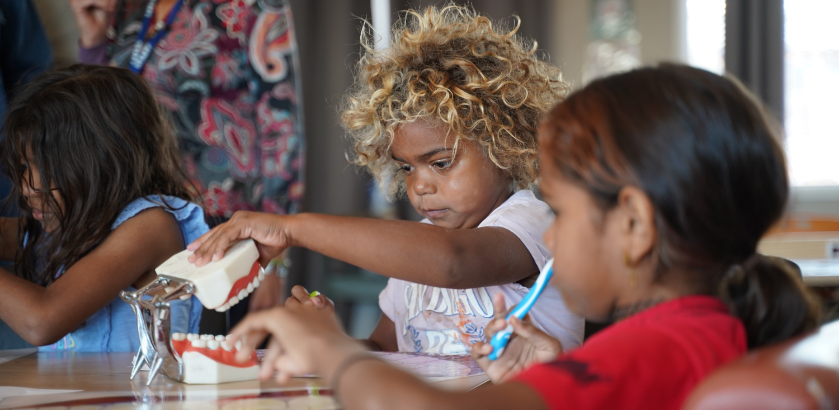A pilot project teaching dental health practices to First Nations children in language has shown to improve oral health speech and literacy.

The successful project was designed for First Nations kids in Aṉangu Pitjantjatjara Yankunytjatjara (APY) Lands in the remote north west of South Australia.
Teaching dental health practices in the Yankunytjatjara language and engaging children in fun learning activities improved oral health speech and literacy and extended the use of the Yankunytjatjara language into a new domain – oral health. Activities were delivered in collaboration with the Indulkana and Mimili communities, and more than 180 people participated.
"Kids were fully engaged with these workshops and activities. This project was designed for Aṉangu tjitji tjuṯa (Aṉangu kids) in their wangka (language), within their tjanampa ngura (community), and was delivered by their walytja tjuṯa (family),” said Yankunytjatjara Senior Aboriginal Language Worker and project team member Karina Lester.
Using language in community health interactions is directly linked to better health outcomes while strengthening language. For this project, the use of language allowed for improved community engagement and reach, as well as greater rates of retention around oral health principles.
Strong relationships and collaboration between the community, project organisers and all partners were key to the project’s success.
When the organisers returned to Indulkana to deliver the last workshops after a 3-month absence, participants remembered the project team as ‘Katitiku Ninti Tjuta’, (the “teeth people”).
The project was highlighted in the recently released Closing the Gap 2024 Annual Report. It supports Priority Reform One and Target 16 of Closing the Gap: Formal partnerships and shared decision making; and Cultures and languages are strong, supported and flourishing.
The pilot project was run by the Mobile Language Team of the University of Adelaide, in partnership with the Dental Hygienists Association of Australia and Nganampa Health Council. It was funded by our Indigenous Languages and Arts (ILA) program.
Find out more
- Learn about the ILA program
- Read the Closing the Gap 2024 Annual Report
- Learn about the Mobile Language team at the University of Adelaide

